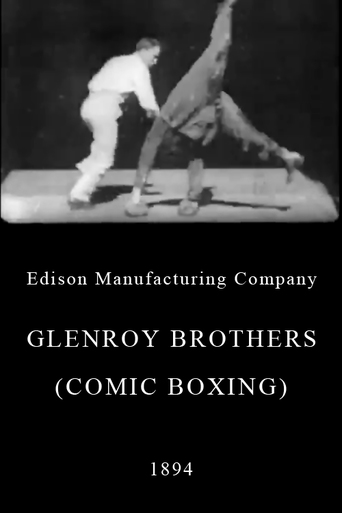Snow Leopard
The Glenroy Brothers were one of the popular vaudeville acts that appeared in some of the Edison Company's numerous movies, and their act works quite a bit better on the silent screen than most of the others did. It's good comedy and is still worth seeing, even though only brief footage of it survives.Unfortunately, because the Edison Company also made many other films of serious boxing matches at about the same time, a number of films that are now labeled as Glenroy Brothers movies are actually footage of other, serious boxers. The rough, unfinished boxing styles of the era and the sometimes staged spectators in the background can make it possible to think that a genuine boxing match is a comic vignette.But a genuine Glenroy Brothers is actually fairly easy to identify. Their stage act was called, 'The Tramp & the Athlete', and their routines were based on that theme. One brother would dress in all-white clothing, as 'the Athlete', and would try to fight in a classic boxing style. The other brother would dress in shabby dark clothing as 'The Tramp', and would perform cartwheels and other such antics, to throw off his opponent.In one of Kino's otherwise excellent compilations of early films, they included some footage of a match between two real boxers (Hornbacker and Murphy), and erroneously titled it as "Glenroy Brothers (Comic Boxing)". For this reason, the other review that is posted to this title (as of the time of this writing) actually describes this other movie, "The Hornbacker-Murphy Fight" (1894). (It is a detailed, well-written, and interesting review, but it does not refer to any Glenroy Brothers movie.) Many other sources also have this same misidentification, undoubtedly based on the original mistake in the video collection.There were at least two actual Glenroy Brothers features filmed. The second one is included in a newer Kino DVD collection of Edison movies, which was compiled with the assistance of film historian Charles Musser, an expert on the subject. (Interestingly, this newer collection also includes the Hornbacker-Murphy footage, now under its correct title.) This first Glenroy Brothers feature may be lost, since the only genuine Glenroy Brothers feature that appears to be readily available today is the second one. It's very possible that, as happened with many of the very earliest movies, the negatives wore out quickly and were replaced by a remake.
Brandt Sponseller
This 25-second long Edison Company kinetoscope short features vaudeville performers "The Glenroy Brothers" performing their "comic boxing" in a ring. There is a referee attending and frequently breaking up the action, and there are five people sitting in the ring, along the "back" rope. In some accounts, these five spectators are Edison Company employees. Note that this is often referred to as "The Glenroy Brothers (No. 2)", so there appears to be some confusion over which short is No.1 and which is No. 2.I haven't been able to locate much information on The Glenroy Brothers, but for me, the most interesting thing about this short is the staging. The contrast of the constant motion of the boxers and referee against the almost immobile spectators flanked by two chairs is enthralling aesthetically. This staging isn't just an accident, because it's unusual for there to be spectators in the ring.It has all the effect of a George Bellows boxing painting, such as Stag at Sharkey's, come to life. Bellows would have been about 12 when The Glenroy Brothers would have been showing on the kinetoscope in New York City, and he's unlikely to have seen it then, but Bellows did come to New York City in the early 1900s to study. Stag at Sharkey's was painted in 1909.Being this far removed in time from The Glenroy Brothers, it's difficult to say what exactly makes this boxing "comic", but the fighting style is certainly humorous now. It consists primarily of each combatant swaying towards his opponent with both hands held high, only to basically bounce off of the same motion. They're mostly aiming for the head, and a couple good jabs are scored, one resulting in a brief knockdown. That the spectators are so statuesque makes this more comic, and a large part of the intriguing aesthetic effect is that the staging looks almost surreal in retrospect.It's also interesting to note the camera motion, which seems to indicate that this was shot with hand-held camera, but I think that may be historically impossible. The kinetoscope cameras, which were the only ones extant at the time, were supposed to be very big and heavy.At any rate, this is a fabulous short that is far ahead of its time. It's too bad the technology didn't exist for longer reels, as this one deserves it.
